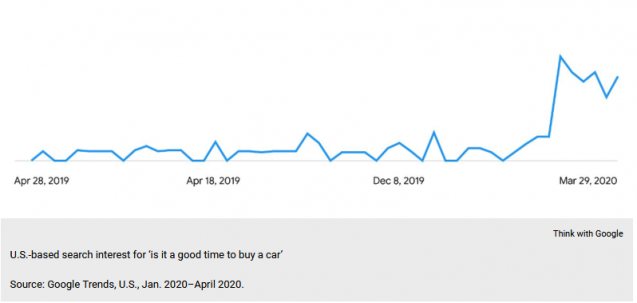From public transport and ride-sharing to international flying, the pandemic put a halt to almost all modes of transportation. By the end of March 2020, the global road transport activity was almost half below the 2019 average.
As people became more sensitive about social interactions and mass transportation, we started seeing an increased interest in personal cars. In China, for example, the usage of personal cars has doubled since the outbreak, and 66% of respondents who do not have a car, would like to buy one within the next 6 months. The same trends play out in the US market as well — 93% of people say they are now using their personal cars more. Furthermore, a Cars.com survey revealed that 20% of respondents who didn’t own a car were considering purchasing one.
That said, the pandemic-caused economic recession and slowed down vehicle manufacturing have car buyers look at used cars. According to a recent report by Edmunds, in June 2020 used cars sales increased by 22% from the previous year.
Dealerships can use these times and reviving consumer demand to re-establish themselves and improve the bottom line. And for that, dealers need a powerful set of tools that would help them streamline operations and reduce inefficiencies while enabling better customer experiences.
Ready to learn what these tools are? Here you go.
Dealer management system
If you needed to narrow your dealer’s toolbelt to just one solution, it would definitely be a dealer management system (DMS). Used by over 98% of dealers, DMS is custom software designed to automate core operations and drive efficiency for automotive dealerships, car rentals, and sellers of industrial equipment.

With a comprehensive DMS solution in place, a dealer can automate day-to-day management tasks and monitor operations across multiple dealership locations — all from a single platform. Modern DMS software also enables auto retailers to stay on top of orders and stock moving in and out of their inventory.
Customer relationship management system
Unlike DMS, a customer relationship management (CRM) system is not dealer-specific but it’s a powerful tool for building meaningful relationships with clients and delivering holistic car buying experiences. A custom automotive CRM solution helps your sales team streamline marketing activities, nurture prospects, and manage leads from multiple sources. Enhanced with data-driven analytics capabilities, a CRM system enables you to deliver the right message to the right customer, ultimately helping you close more deals.
Enterprise resource planning system
From human resources to procurement to accounting, an ERP system ties together different parts of a dealer’s business into a single, easy-to-use interface. By collecting data across systems and departments into a central database, an automotive ERP solution ensures real-time access to clean and normalized data, serving as a single source of truth.

An integrated ERP system is also an intelligence hub, giving dealers a bird’s eye view of their business and real-time insights into key performance metrics. This enterprise-wide visibility enables dealers to improve collaboration, enhance workflows efficiency, and reduce costs.
Finance and insurance
The finance and insurance (F&I) department is where auto dealerships generate revenue through signing deals with customers and offering add-ons like auto loans, extended warranty, auto service contracts, guaranteed asset protection (GAP) insurance, and more. To be that profit driver, your finance office requires a solid F&I system geared to the auto retailers’ needs. From streamlining credit scoring to digital contracting, a tailored F&I solution can support finance workflows and improve your bottom line.
Fixed ops systems
Vehicle sales are not the only thing that generates revenue for dealerships. In fact, fixed operations contribute to almost half of a dealership’s gross profit. And since the sales of new cars fell almost 14% last year, fixed ops can help dealers keep the lights on.
Also called service or body shop, fixed ops include maintenance and repair services that dealerships provide to previous customers and current vehicle owners. These services are critical to customer retention — 74% of respondents who had their car serviced by the dealership of purchase reported that they were likely to buy their next vehicle there.


To support its service department, a dealership needs an integrated solution that would technicians effectively manage repair orders, automate repetitive tasks, and cut service time.
The bottom line
There are a lot of moving parts to running a successful dealership. From front-office customer service to back-office administrative workflows, a dealer needs to stay on top of a myriad of tasks. And technology can lend a helping hand.
A survey by Dealertrack lays out that on average a car dealer leverages 7 different solutions to operate a dealership. The most important of them are DMS, ERP, CRM, F&I, and fixed ops systems. To ensure your dealership runs like a well-oiled machine, these systems must be fully integrated into a cohesive digital dealership ecosystem with seamless data flows between solutions, people, and departments.
That said, not all car management solutions are created equal. Some may lack the required functionality or be overly complex, leaving your staff struggling with basic tasks and making you pay for features you don’t really need. Other solutions may lack integration capabilities, which will lead to data silos and inefficient workflows. If this is the case, the best course of action is to develop custom automotive software tailored exactly to the unique needs of your dealership.















